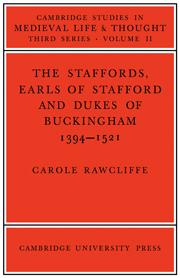Book contents
- Frontmatter
- Contents
- Dedication
- Acknowledgements
- Abbreviations
- Introduction
- 1 THE RISE OF THE STAFFORD FAMILY, 1343–1460
- 2 THE SECOND AND THIRD DUKES OF BUCKINGHAM, 1460–1521
- 3 THE MANAGEMENT OF THE STAFFORD ESTATES, 1438–1521
- 4 THE FIRST DUKE OF BUCKINGHAM'S HOUSEHOLD AND RETINUE, 1438–1460
- 5 CHANGES IN THE DUCAL LIFESTYLE, 1460–1521
- 6 THE FINANCES OF THE STAFFORDS, 14OO–1473
- 7 THE FINANCES OF THE STAFFORDS, 1473–1521
- 8 THE STAFFORDS AND THEIR COUNCIL
- 9 THE STAFFORDS AND THE COMMON LAW
- CONCLUSION
- APPENDICES
- Manuscript Sources
- Printed Sources
- Index
6 - THE FINANCES OF THE STAFFORDS, 14OO–1473
Published online by Cambridge University Press: 07 October 2011
- Frontmatter
- Contents
- Dedication
- Acknowledgements
- Abbreviations
- Introduction
- 1 THE RISE OF THE STAFFORD FAMILY, 1343–1460
- 2 THE SECOND AND THIRD DUKES OF BUCKINGHAM, 1460–1521
- 3 THE MANAGEMENT OF THE STAFFORD ESTATES, 1438–1521
- 4 THE FIRST DUKE OF BUCKINGHAM'S HOUSEHOLD AND RETINUE, 1438–1460
- 5 CHANGES IN THE DUCAL LIFESTYLE, 1460–1521
- 6 THE FINANCES OF THE STAFFORDS, 14OO–1473
- 7 THE FINANCES OF THE STAFFORDS, 1473–1521
- 8 THE STAFFORDS AND THEIR COUNCIL
- 9 THE STAFFORDS AND THE COMMON LAW
- CONCLUSION
- APPENDICES
- Manuscript Sources
- Printed Sources
- Index
Summary
The economic position of the later medieval nobility has long been a matter of debate. But recent research into the finances of individual families clearly shows that the astute and resourceful landlord could usually overcome such problems as falling property values or opposition from local tenantry by showing resilience and adaptability in the face of changing circumstances. Whereas Richard, Duke of York, appears to have been a very poor administrator, other great landowners, both lay and ecclesiastical, were able to avoid any serious loss of revenue because they managed their estates efficiently. It would, however, be unwise to hold any landowner entirely responsible for his own success or failure. A regular income composed largely of rents and entry fines became less attractive once the purchasing power of that income began to fall; this could in part be offset by the careful husbanding of available resources, but if, like Richard Beauchamp, Earl of Warwick, or Richard, Duke of York, a landlord spent long periods abroad, the results of a lack of personal control soon become apparent. Despite frequent visits to France in the 1420s and 1430s Humphrey, first Duke of Buckingham, was able to maintain a fairly tight hold over the direction of his affairs, since he was fortunate in the loyal and skilful officials who advised him. Of far greater consequence for Buckingham and his descendants were the financial and administrative effects of the three long minorities which beset the house of Stafford during the fifteenth century.
- Type
- Chapter
- Information
- The Staffords, Earls of Stafford and Dukes of Buckingham1394–1521, pp. 104 - 124Publisher: Cambridge University PressPrint publication year: 1978



